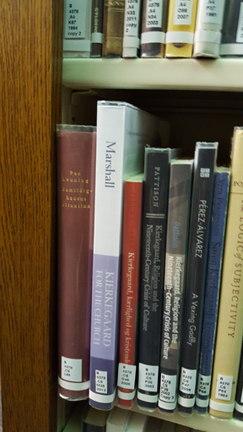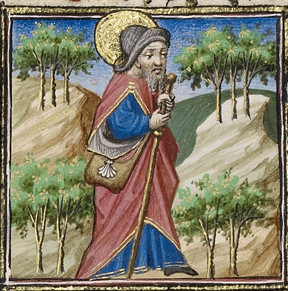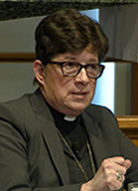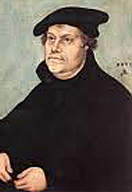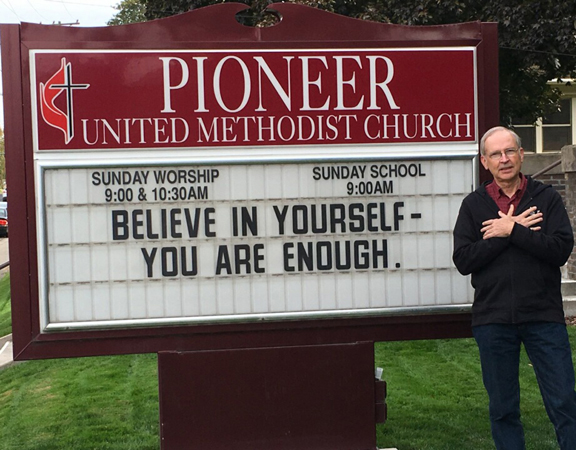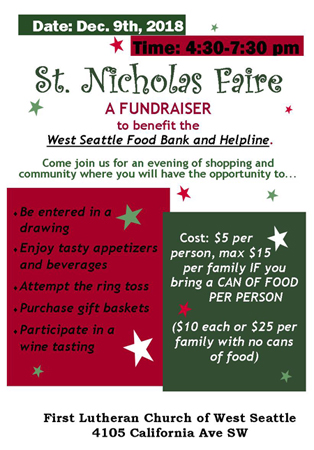November 2018
Loved by God
Nobody loved Jesus more than God did – and just look how it
worked out for him. He was “stricken, smitten by God, and
afflicted,” “a man of sorrows, and acquainted with grief”
(Isaiah 53:3–4; Acts 8:35). He was also betrayed, spit upon;
slapped; mocked; beaten; and nailed to a cross and killed
(Matthew 26:49, 67, 27:26–31, 50). And why? Because it was God’s
“definite plan” to make Jesus suffer and die (Acts 2:23). That’s
how God loved him.
|
||
Pastor Marshall’s Endorsement on the back of Dr. Braaten’s new
book
— 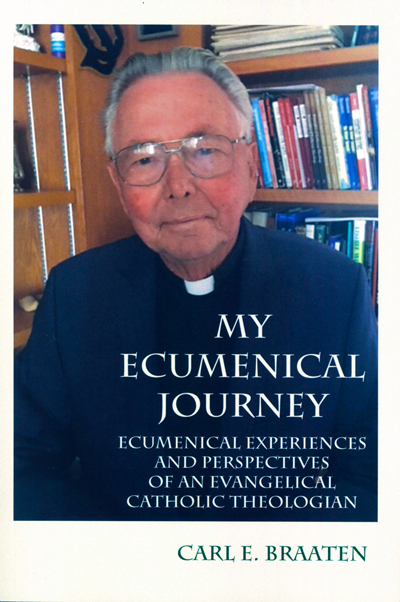  |
|
|
PRESIDENT'S REPORT...by
Bob Baker
Luther: Strangers and
Sojourners on Earth
“These all died in faith . . . having acknowledged that they were
strangers and exiles on
the earth.” (Hebrews 11:13).
“The Apostle here desires to show that we should look upon this
life as a stranger and pilgrim looks upon a land in which he is
a stranger or a guest. A stranger cannot say, Here is my
fatherland, for he is not at home there. A pilgrim does not
think of remaining in the land to which he makes his pilgrimage,
or in the inn where he stays the night, but his heart and
thoughts are directed elsewhere. He feeds in the inn and rests,
and then he continues his journey to the place where his home
is.
“Therefore conduct yourselves as guests and strangers in this
strange land and strange inn, and take nothing from it but food
and drink, clothing and shoes, and what you need for your
night’s rest, and keep your thoughts on your fatherland where
you are citizens.
“We must note this carefully. We must not seek to build for
ourselves eternal life here in this world and pursue it and
cleave to it as if it were our greatest treasure and heavenly
kingdom, and as if we wished to exploit the Lord Christ and the
Gospel and achieve wealth and power through Him. No, but because
we have to live on earth, and so long as it is God’s will, we
should eat, drink, work, plant, build, and have house and home
and what God grants, and use them as guests and strangers in a
strange land, who know they must leave all such things behind
and take our staff out of this strange land and evil, unsafe
inn, homeward bound for our true fatherland where there is
nothing but security, peace, rest, and joy for evermore.”
Please keep the Mission and Ministry of our congregation in your
prayers.
|
|
|
STEWARDSHIP
Stewards of
Our Bounty
Recently we
sang “Son of God, Eternal Savior” as the closing hymn at church.
I found the last two stanzas of the second verse both
simultaneously challenging and inspiring.
The third stanza, “Yours the gold and yours the silver,
yours the wealth of land and sea” is a challenging reminder that
while we think we are in control of, owners of, and creators of
our own wealth, that thinking is wrong – God is the creator of
our wealth, which He freely gives to us.
Then, the final stanza instructs us what we are to do
with the wealth that God has blessed us with, and what our role
is with regard to our money and property – “we but stewards of
your bounty held in solemn trust will be.”
God gives us money and wealth that we would be stewards
over it, and that we would hold and use it in trust for God’s
purposes in the world.
As you think about your giving to the church and to
extended ministries and other charities, think about the words
of this wonderful hymn that both challenges us and our
conception of where our wealth comes from and who creates it,
and tells us that as stewards of the gifts God gives us, we
should use those gifts to glorify Him, further His purposes on
earth, and not waste the freely given gifts of God on things not
worthy of the great gift He daily gives to us.
David King, Church Council |
|
|
GUIDELINES for GIVING
to
FIRST LUTHERAN CHURCH
OF WEST SEATTLE (FLCWS)
The greatest need our church has to sustain its operations and
faithful traditions are monetary gifts to the general budget.
In some cases, families are compelled to give special
designated gifts either because they are aware of a special need
the church has, or because they want to support a program the
church is sponsoring, or because they want to give something in
memory of a loved one and/or congregational member.
These guidelines are designed to help families understand
the different types of gifts that can be made to the church.
REGULAR GIVING (non-designated/general budget)
Anyone, member or non-member, can give gifts to our church.
You can give cash or checks on Sunday when the offering
plate is passed around.
If a check, make it out to First Lutheran Church of West
Seattle. This money goes to the general budget of the church to
pay for all the operating expenses, for example, payroll,
building expenses, and extended ministries.
This type of
giving is the most critical need of our church.
FLCWS conducts an annual pledge drive to assist the church
council in setting the budget each year.
Members are encouraged to participate in the annual
pledge drive. For
your convenience, you can set up a regular occurring auto
deduction from your bank account and give electronically.
This can easily be set up through the church office.
The Biblical guideline is that you give 10% of your gross
earnings (from salary & all investments) each month.
If you do not meet this Biblical goal, you are not
punished in any way by this church.
Instead we only wish that you keep trying to meet the
Biblical goal and hopefully are able to increase your giving
year after year until you meet the 10% tithe.
SPECIAL GIVING (designated gifts)
Designated gifts are above and beyond your regular giving to the
church. They are
designated to a special project or fund.
The money is then restricted to that designation.
They can be in any amount (large or small) and you do not
have to be a member to give designated gifts to the church.
They can be in cash or
in stocks, bonds, etc.
Designated gifts made to church sponsored programs and/or budget
line items can be made by simply writing the designation on your
check or by letting the church office know where you would like
the money to go. A
few examples of designated gifts to church sponsored programs
and/or budget line items are: Worship Supplies, Extended
Ministries, and Building Maintenance Fund.
If you want to make a designated gift that is not to an existing
church sponsored program or budgeted item, please contact the
Pastor to go over your options.
Depending on the specifics of your designated gift, it
may need to go to the church council to be discussed and
reviewed before the designation of the gift can be approved.
Consideration for accepting/approving a designated gift
will include an assessment of the gift creating any ongoing
expense and/or responsibilities for the church maintaining the
gift. This would
include designated memorial fund gifts.
Non-designated memorial fund gifts are used at the
discretion of the church council.
Extra monies given via the special THANKSGIVING envelope are all
designated to the West Seattle Food Bank and Helpline.
ENDOWMENT FUND GIVING
Designated gifts may also be made to the Endowment Fund.
The goal of the endowment fund is to actively manage the
investments of money, while preserving the investment principle,
to generate income to support the general budget.
Gifts to the endowment fund can be in cash or in stocks,
bonds, real estate, etc.
Designated gifts made to the endowment fund can be made
by simply writing “Endowment Fund” on your check or by letting
the church office know that you would like your gift to go to
the endowment fund. Once again,
for FLCWS members,
designated gifts are above and beyond your regular giving to the
church.
Please contact the pastor regarding any questions you may have
about giving to FLCWS.
September 2018 – Continuing Resolution
Printed November 2018 |
|
Bishop Eaton’s Mistake
By Pastor Marshall The Presiding Bishop of the ELCA, Elizabeth Eaton, attenuates
the Gospel when she says that God doesn’t have to be “appeased”
in order to set us free from our “murderous rebellion” (Living
Lutheran, October 2018). But in Martin Luther’s 1544 sermon on John
3 he says just that: “Because there was no other counsel or
remedy through any creature in heaven or earth to appease His
eternal wrath at sin and to redeem from eternal death, the only
Son of God had to take our place and become a sacrifice for our
sin, through which God’s wrath would be appeased and
satisfaction would be made” (Luther’s Works 78:50). This
sermon fills out Luther’s Small Catechism (1529) and
tells the whole truth about salvation. This is the “richer and
fuller understanding” that the
Small Catechism asks
for in its Preface — something which Bishop Eaton has left out
of her coverage of the Small Catechism.
|

KARL BARTH
100TH
ANNIVERSARY
His Romans Commentary of 1918 “If only [the
Church] would not so grimly struggle to live. It can hear and
proclaim the Word of God – if, without any pretensions of
becoming great through the Word, and without any anxiety for the
morrow, it would care only for the Truth of the Word…. If the
Church were sufficiently humble to… endure patiently the sneers
of the rationalists;… if it were courageous enough to keep its
eyes fixed upon its own theme, to abandon all striving after,
attaining, and boasting about, visible goals and successes;… if
only it would bring forth good and pious people – that most
obstinate species of the human genus! – by persistently and
tirelessly confronting them with the hosts of men who have been
justified by God, such as… Imperialists, Capitalists, and other
unsympathetic persons, as for example, those who are not devoted
to Social Reform; if only the Church were directed wholly and
altogether towards the unknown, living, free God, and would
concentrate its preaching upon the Cross of Christ – then the
Church could be,… in a manner unheard of, the Church… of the
righteousness of God…. But [then] the Church… must dare to begin
in faith, in the ‘darkness’ of faith (Luther). And this the
Church has never dared…. It is oriented to what can be seen of
men…. The Church does not love the solitariness of the desert….
The Church does not wish to be a stranger in the world…. Faith,
as it appears in Hebrews 11, seems to the Church too
unsympathetic, too loveless, too dangerous, too unpsychological,
too unpractical.”
[Karl Barth,
The Epistle to the Romans
(1918),
6th edition (1928) trans. Edwyn
C. Hoskyns
(New York: Oxford, 1968) pp.
367–68 ]. |
from Phil Nesvig’s recent trip to Walla Walla, Washington. |
November Book
With the Mind:
Readings in Contemporary Theology
12-2 pm in the Church Lounge, Sunday, November 18th
The book for
November is C. S. Lewis’s
Mere Christianity: A Biography (2016), by George M. Marsden,
renowned historian and winner of the Bancroft prize and Merle
Curti award. Based on four radio broadcasts,
Mere Christianity
(1952) has sold millions of copies and been translated into
thirty-six languages! It is a modern day “classic” (1). It’s a
simple (56, 111), clear (171) and poetic (176) presentation of
basic Christian teachings – apart from any denominational
confessions (182). There’s nothing like it in modern America.
The Lutheran Paul Holmer makes a case for its reliability
(110–11, 169). If someone you know wants to read book about
Christianity, it’s probably the best one around for the general
reader. (Marsden also lists a few of the standard criticism
against this classic – 139–52.)
A copy of this history of the classic by C. S. Lewis is
in the library. If you would like to purchase one for yourself,
contact Pastor Marshall. Feel free to attend our meeting when we
discuss how to describe Christianity in simple terms.
ANNOUNCEMENTS:
THANKSGIVING EVE:
Thanksgiving
will be observed with Holy Eucharist on Wednesday, November 21st
at 7 pm, in the chapel.
COMPASS HOUSING ALLIANCE:
Until Friday, December 14th, we will be collecting
Christmas gift items for the Compass Center for both men and
women. Some
suggested items to collect are: fast food, coffee shop, Target,
and grocery store gift cards in $5 to $25 increments;
new sweatshirts in
large sizes with the tags on, underwear, flip-flops, hats and
gloves in neutral colors and
new toiletries in
small sizes. Also, cash donations are welcome.
Please leave your donations at the office.
FREE MONEY?
Sign up for the
Bartell Drugs loyalty
card program and designate First Lutheran Church of West
Seattle. 4% of your
purchases will be automatically donated to the church.
Also Amazon.com has a program called
Amazon Smile that one
can sign up for.
FLOWER CHART:
There are still a few spaces left for Christmas flowers.
FOOD BANK COLLECTION
suggested donation for November is holiday foods: canned yams,
turkey, gravy, cranberries, stuffing and pumpkin.
|
|
Saint Nicholas Faire
Sunday, December 9th, from 4:30 pm to 7:30 pm
The feast day of Saint Nicholas is coming soon and preparations are moving full steam ahead. All we need is YOU!!! Plus we need your friends and family to come and enjoy the festivities too. Please plan to join in the celebration.
Sign-up sheets are now posted in the Parish House on the
bulletin board between rooms C & D.
This year we are asking for donations of wine, beer,
and/or sparkling cider for prizes; helpers in the kitchen and at
the event; expert bakers to provide us with elegant desserts to
share; and people to help close the silent auction tables and
distribute the baskets to those who bid the highest.
It takes a lot of people to make the Saint Nicholas Faire
a success. Your
willingness to help and support this is very much appreciated.
Remember,
this is a fund raiser for the
West Seattle Food Bank
and the West Seattle
Helpline. All
the money that is contributed and raised is given directly to
these two deserving extended ministries.
But it will not be a success unless
you come, bid on
items, and have a good time!
SEE YOU SUNDAY,
DECEMBER 9,
2018, FROM 4:30 PM
to 7:30 PM!
Larraine King |
On Hell
Correcting a Wayward Lutheran
Scholar
By Pastor Marshall Even though
Dr. Timothy Wengert is highly regarded as a Luther scholar
worldwide, his teaching on heaven and hell in the
Living Lutheran
(October 2018) leaves much to be desired. (Furthermore he
probably sides with Karl Barth’s statement, which he quotes,
that hell is empty – even though he says that this might be
going too far – which is also a weak critique of Barth. And so I
think he secretly sides with him – which puts Wengert in direct
violation of church teaching.) Wengert’s
right that who goes to heaven and hell is up to God, and not to
us. Of course! But he is wrong that we are just to sit and wait
to find out what happens. The New
Testament says we are instead to warn the world of the coming
damnation punishing those not believing in Christ (John 3:36; 1
John 5:12; 2 Thessalonians 1:9). We also
know for sure that only a few go to heaven and many go to hell
(Matthew 7:13-14). And we know
that hell is a “place of torment” (Luke 16:23, 28) – not a state
of mind. We also
know that heaven and hell are eternal (Matthew 25:46) – and that
you can’t move back and forth between the two (Luke 16:26). Furthermore
we don’t send ourselves to hell by not believing, as Wengert
says. God sends us to hell by hardening us (Romans 9:18). It
doesn’t depend on our will (Romans 9:16). Luther underscores
this in The Bondage of the Will (which Wengert quotes,
but only spottily). So according to Luther, God “saves so few
and damns so many” (Luther’s Works 33:62). Therefore we
have as much free will as “a stone or a log of wood” (LW
33:109). So the same
logic requires us to praise God “when he damns the undeserving
as when he saves the unworthy” (LW 33:208). You can’t have grace
without wrath. Therefore
we don’t know who is going to heaven and who is going to hell.
Nor do we decide who is going to heaven and who is going to
hell. But we do know whoever believes and is baptized will be
saved (Mark 16:16; Small
Catechism 4.8 –
contra the Biblical critics who dismiss these last verses of
Mark’s Gospel as inauthentic). It’s just that we don’t know who
believes individually. People can
fake it, after all (Jeremiah 17:9) – and fool any and all of us.
God is the only one who cannot be fooled – for he is the only
one who can see into our hearts (1 Samuel 16:7). But that
doesn’t mean that we don’t know anything at all about heaven and
hell. We know plenty – and it’s all scary. No wonder then that
the brightest say that we don’t. |
Raising Eleven Children
A Factory of Joy
By Pastor Marshall
Bruce and
Bonnie Dike have been worshipping with us for about two years.
They commute from Issaquah where they moved to from Missouri in
2000. In Missouri they raised eleven kids (no twins or triplets)
– six girls and five boys, born between 1980 and 1999 – with a
son named Malcolm (almost) in the middle – before there was that
popular TV show. Why stop at eleven? After the last one was
born, then simply, no more babies arrived. Didn’t they know they
are cheaper by the dozen? Well, maybe, but it was out of their
hands. When young couples tell them they aren’t ready yet to
have children, they say: “No one ever is! If there is a right
time, it’s right now!”
Bruce and Bonnie both grew up outside of Lansing, Michigan –
Bruce being a couple years older. They were high school
sweethearts and attended Michigan State University together. At
an early age Bruce learned to play the violin and Bonnie the
cello. Bruce elected to earn his bachelor and master degrees in
mathematics. But both played their instruments to pay their way
through college – with Bonnie getting her degree in music. Over
the years Bruce has worked for McDonnell-Douglas in Missouri and
Boeing in Seattle. Bonnie has been a home maker – and also
educated her children at home. Their youngest two children are
now in college and so since 2017 they are empty-nesters. Both
Bonnie and Bruce still play their instruments. Bonnie is
teaching some yoga classes now that she has some extra time.
“Why should the Hindus have all the fun!” – she says.
How did they raise so many kids? Bonnie and Bruce’s siblings
just shake their heads when they think of their large family.
Both of them say their home was a “factory of joy.” The few
problems they had raising their children pale when compared to
the happiness they had together. Whatever difficulties they had
are forgotten! For summer vacation they would rent a fifteen
passenger van, load it with camping gear and head out on an
adventure – every year. After their third child was born, the
family dynamics didn’t change much when the others were born.
They just went from a man-to-man defense to a zone defense
(football jargon). At their peak there were five cars in the
drive way; 3 full bathrooms; and six bedrooms. The kids policed
their own bathrooms – one for the girls and one for the boys.
All the children get along. No jealousy, then or now. Everyone
was too busy at home for there to be enough emotional gasoline
for any major drama. Bruce would always have the kids help with
his tasks around the house – including working on their fleet of
cars.
How did they pay for it all? It helped that Bruce was granted
steady and rewarding employment. All the children have gone to
college (but not all have graduated yet). Bonnie and Bruce have
assisted them with their educational expenses (with their kids
attending affordable public universities). Seven of them are
married. One daughter has six children of her own (Bruce and
Bonnie have thirteen grandchildren at last count.). There are
two keys to their success. Thrift and economy is the first –
both of money and activity. They discovered the truth of 1 Kings
17:16 – that the cruse of oil never fails and the jar of meal
never goes empty! And when occasional stirrings arose, Bruce
often counseled 1 Timothy 6:8 – “and having food and raiment let
us be therewith content” – and then he usually gave in. Next is
Mom and Dad learning more from their independent and
strong-headed children than what they gave them – being that
they believed there were and are strong divine arms holding them
all together. Both Bonnie and Bruce said they couldn’t
manipulate them even if they wanted to (which they learned early
on not to try). Their children are from God and belong to Him
and so they are only loving guardians and stewards of their
upbringing. Parenting is a beloved Christian duty – but also the
most wonderful adventure of their lives.
Eight of their children were born at home with a midwife and a
wonderful home doctor (who was from Jamaica – and became a
family friend), all with successful deliveries. The children
were all healthy and required little medical care growing up –
except for one who was seriously ill for several months, but
made a full recovery. All their children learned to play a
musical instrument. All were baptized and many of them attend
church. Seven are married – all to fine people. What a story,
wouldn’t you say? Give
thanks to God for the Dike family! And keep an eye out for their
children when they visit and attend church together. Some
already have. And, oh yes, their names are Emily, Julia, Byron,
Margaret, Charlotte, George, Malcolm, Elizabeth, Wesley, Robert
and Madeleine.  |
|
1 Corinthians 13.11
Monthly Home Bible Study, November 2018, Number 309
The Reverend Ronald F. Marshall
Along with our other regular study of Scripture, let us join as
a congregation in this home study. We will
study alone then talk
informally about the assigned verses together as we have
opportunity. In this way we can "gather
together around the
Word" even though physically we will not be getting together
(Acts 13.44). (This study uses the RSV translation.)
We need to support each other in this difficult project. In 1851
Kierkegaard wrote that the Bible is "an extremely dangerous
book....[because] it is an imperious book... – it takes the
whole man and may suddenly and radically change... life on a
prodigious scale" (For
Self-Examination). And in 1967 Thomas Merton wrote that "we
all instinctively know that it is dangerous to become involved
in the Bible" (Opening
the Bible). Indeed this word "kills" us (Hosea 6.5) because
we are "a rebellious people" (Isaiah 30.9)! As Lutherans,
however, we are still to "abide in the womb of the Word" (Luther's
Works 17.93) by constantly "ruminating on the Word" (LW
30.219) so that we may "become like the Word" (LW
29.155) by thinking "in the way Scripture does" (LW
25.261). Before you study then, pray: "Blessed Lord, who caused
all holy Scriptures to be written for our learning: Grant us so
to hear them, read, mark, learn and inwardly digest them, that
we may embrace and ever hold fast the blessed hope of
everlasting life, which you have given us in Our Savior Jesus
Christ. Amen" (quoted in R. F. Marshall,
Making A New World: How
Lutherans Read the Bible, 2003, p. 12). And don’t give up,
for as Luther said, we “have in Scripture enough to study for
all eternity” (LW
75:422)!
Week I.
Read 1 Corinthians 13.11 noting the line
I thought like a child, I
reasoned like a child. What’s that like? On this read
Ephesians 4.14 noting the words
tossed,
carried,
doctrine,
cunning,
craftiness and
deceitful. This is
about doctrinal instability and personal gullibility. Kids don’t
hold on to the traditions of old, nor do they dig in and resist
fads and trends – ungrounded in Holy Scriptures. On these two
points read 2 Thessalonians 2.15 and 1 Corinthians 15.58. What
prevents the immature from doing these things? On this read
Galatians 1.10 noting the contrast between
pleasing and
serving. Where does
this childish flexibility come from? On this read 1
Thessalonians 2.13 noting the contrast between
word of men and
word of God. If it is
the first, then we have a lot of latitude and freedom to act and
think the way we want. Do kids love being free of all
discipline? On this read 1 Timothy 3.4 noting the words
manage,
submissive and
respectful. How do
you like that?
Week II.
Read again 1 Corinthians 13.11 noting the same line
I thought like a child, I
reasoned like a child. Why don’t children like being
disciplined in their thoughts and thinking? On this read Hebrews
12.11 noting the word
pleasant. On this word see 2 Timothy 3.4 noting the line
lovers of pleasurer
rather than lovers of God. How does pleasure take us over
like that? On this read Galatians 5.17 noting the words
against and
opposed. Because of
this contestation and confrontation, many believers capitulate
to our base and vile flesh – in order to avoid conflict. That
leaves us childlike. Why’s this a problem for us? On this read
Ecclesiastes 9.18 noting the line
one
sinner destroys much good.
So caving into the flesh is a disaster. Wallowing in the flesh
brings about the list of failures in Galatians 5.19–23, where
self-control is
central. If the flesh runs free then those horrible works listed
in Galatians 5 quickly follow. This is precisely what maturity
resists. Do you agree?
Week III.
Reread 1 Corinthians 13.11 noting again the line
I thought like a child, I
reasoned like a child. Any other childlike traits? On this
read Hosea 4.6 noting the line
lack of knowledge.
Immature thought therefore rests on flimsy evidence. So when
kids think – they make up stuff. Their thought is fantastical.
But without factual grounding what they come up with isn’t very
helpful. Note also the
hate for knowledge
in Proverbs 1.22 and the
foolishness that comes with it. Childlike thought is also
fixated on itself. On this read the Golden Rule Luke 6.31 noting
the form as to you, so to
them. This parallel is not found in selfish, childlike
thinking. This parallel is also based on the
living sacrifice in
Romans 12.1. What do you make of that and how does it help us
raise children to think properly in our own time? Do these
sacrifices make us less selfish? On this read 2 Corinthians 6.13
noting the line I speak
to you children, widen your hearts. This widening brings in
others to improve our condition. It also enables us to practice
the parallel in the Golden Rule.
Week IV.
Read 1 Corinthians 13.11 one last time noting that line
I thought like a child, I
reasoned like a child again. What other childish traits
might there be? On this read 1 Corinthians 14.20–22 noting the
distinction between
tongues with
believers and
unbelievers. Without distinctions – like this one –
confusion follows and mature thinking comes to an end. How can
distinctions do that? On this read 2 Timothy 2.15 noting the
phrase rightly handling
or dividing. By keeping matters in their own place, our thinking
about them won’t become reckless. Note also the words
correction and
profitable in 2
Timothy 3.16. Childish corrections aren’t constructive or
profitable. In part
that is because, as we’ve seen, they lack that parallel recorded
in Luke 6.31. Read also Proverbs 28.23 noting the unlikely
favoring of rebuking
over flattery. Kids
turn it around the other way. Nevertheless
flattery isn’t the
way to go. Finally note the place of
quiet and
shame in mature
thinking according to Proverbs 9.13. Why are kids shameless and
noisy? Why does the opposite matter so? On this see the sequence
– considering and
buying – in
maintaining property in Proverbs 31.16. Do you agree? |
Remember in prayer before God those whom He has made your
brothers and sisters through baptism.
Bob & Barbara Schorn, Eileen Nestoss, Marlis Ormiston, Aasha
Sagmoen & Ajani Hammond, Kyra Stromberg, Melanie Johnson, Matt
Anderson, Cristian Clemente, Jeannine & Gregory Lingle, Milly
Nikula, Larraine King, Tabitha Anderson, The PLU Lecturers,
Celia Balderston, The Rev. John Hinderlie, The Rev. Paul Smith,
The Rev. Dan Peterson, Sheila Feichtner, Ion & Galina
Ceaicovschi, Deanne & Lucy Heflin, Jim & Hillary Thoren, Bessie
Cook, Rubina & Marcos Carmona, Judy Beach, Sharon Cooper,
Stephanie & Magnolia Juhl, Emily Cole, Harold Jensen, Yuriko
Nishimura, Maddie Harris, Marylou & Paul Jensen, Chris & Margeen
Boyer, Mary Hanson, Brad Baker, Linda Jacobin, Antonio, Jessica,
Scott & Sanny Paulson and pray for those recovering from the
mass shooting at the Jewish synagogue, Tree of Life
Congregation, in Pittsburgh, Pennsylvania.
Pray for the shut-ins that the light of Christ may give them
joy: Bob & Mona Ayer, Bob & Barbara Schorn, Joan Olson, Chuck &
Doris Prescott, C. J. Christian, Anelma Meeks, Dorothy Ryder,
Lillian Schneider, Crystal Tudor, Nora Vanhala, Mary Goplerud,
Martin Nygaard.
Pray for the new members that they may all the more rejoice in
Christ and serve him with diligence:
Pray for Earl Mathias (Matt) Anderson who transferred
from Silverdale Lutheran Church.
Pray for those who have suffered the death of a loved one:
Pray that God will bear their grief and lift their
hearts: Pray for
the family and friends of
Mildred Nikula,
who died in Irving California,
on the 30th of September.
Pray for our bishops Elizabeth Eaton and Brian Kirby Unti, our
pastor Ronald Marshall, our deacon Dean Hard and our cantor
Andrew King, that they may be strengthened in faith, love and
the holy office to which they have been called.
Pray that God would give us hearts which find joy in service and
in celebration of Stewardship.
Pray that God would work within you to become a good
steward of your time, your talents and finances.
Pray to strengthen the Stewardship of our congregation in
these same ways.
Pray for the hungry, ignored, abused, and homeless this
November. Pray for
the mercy of God for these people, and for all in Christ's
church to see and help those who are in distress.
Pray for our sister congregation:
El Camino de Emmaus in the Skagit Valley that God may
bless and strengthen their ministry.
Also, pray for our parish and it's ministry.
Pray that God will bless you through the lives of the saints:
Saint Andrew, the Apostle. |
|
A Treasury of Prayers O Lord God, I know that you are the end for
which I was created, and that I can expect no happiness but in
you. I know that you will carry me through this life to that
eternal glory – and this out of the excess of your pure mercy,
unworthy as I am of your care for me. Give me strength, fill me
with your love, rule my heart, that with all my heart, I may
love you. In Jesus’ name I pray. Amen.
[For All the
Saints I:44, altered] |
